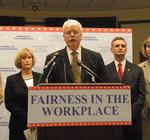WASHINGTON, D.C. – U.S. Rep. George Miller (D-CA), the chairman of the House Education and Labor Committee, today issued the following statement on Equal Pay Day. The day commemorates how far into the year a woman must work in order for her wages to equal those of a man in the previous year.
“In an economy as difficult as ours, the fundamental value of equal pay for equal work is more important than ever. This marks the first Equal Pay Day in eight years with a President and Labor Secretary who are committed to restoring fairness in the workplace – and the change is already evident. By signing the Lilly Ledbetter Fair Pay Act into law during his first days in office, President Obama has given women and other workers the ability to fairly challenge unlawful pay discrimination.
The House Education and Labor Committee will hold a hearing on whether our nation’s health and safety laws ensure that employers who fail to protect their workers are adequately penalized and deterred from committing future violations.
Congress passed the Occupational Safety and Health Act in 1970 with the goal of assuring safe and healthful working conditions to all American workers. Nearly 40 years later, while workplace health and safety has improved, many workers remain at risk of death, injury or illness while on the job.
WASHINGTON, D.C. – U.S. Reps. George Miller (D-CA) and Rob Andrews (D-NJ) and U.S. Sen. Tom Harkin (D-IA) today said that a proposal unveiled by three companies this weekend as an alternative to the Employee Free Choice Act would further undermine workers' rights on the job. Miller, Andrews and Harkin, leaders in the House and Senate on the Employee Free Choice Act, issued the following statement opposing this approach:
“This proposal is unacceptable. It was written by CEOs for CEOs. It is not a serious attempt at labor law reform because it fails to fundamentally address key problems that currently prevent workers from being able to join together and bargain for a better life.
WASHINGTON, D.C – U.S. Rep. Lynn Woolsey (D-CA), chair of the Workforce Protections Subcommittee of the House Education and Labor Committee, issued the following statement on the U.S. Occupational Safety and Health Administration’s announcement that they will withdraw a Bush era procedural roadblock to that slowed protections for workers who handle the dangerous food flavoring diacetyl.
WASHINGTON, DC – Majority Leader Steny H. Hoyer (Md.) issued the following statement today after the Employee Free Choice Act was introduced in the U.S. House and Senate:
“Today, Chairman Miller and Senators Kennedy and Harkin introduced legislation to give hard-working Americans the tools they need to secure fair wages and treatment at their jobs.
WASHINGTON, D.C. – Leading members of the U.S. Senate and House today introduced legislation that would help enable workers to bargain for better wages, benefits, and working conditions by restoring their rights to form unions.
WASHINGTON, D.C. – More needs to be done to encourage paid sick and family medical leave policies that help workers balance work and family, witnesses told the Subcommittee on Workforce Protections of the House Education and Labor Committee.
WASHINGTON, D.C. – Whistleblowers who call out illegal activities are not adequately protected from retaliation from their employer, according to a report released by the U.S. Government Accountability Office today. GAO found these problems stem largely from a lack of resources and proper tracking of complaints, as well as a complicated patchwork of regulations that aim to protect whistleblowers. The investigation was requested by U.S. Reps. George Miller (D-CA), Lynn Woolsey (D-CA) and U.S. Senator Patty Murray (D-WA).
WASHINGTON, DC -- U.S. Rep. George Miller (D-CA), the chairman of the House Education and Labor, issued the following statement today after President Obama signed three executive orders to restore workers’ rights in federal contracts and the creation of a Middle Class Task Force
WASHINGTON, DC -- U.S. Rep. George Miller (D-CA), the chairman of the House Education and Labor Committee and chief House sponsor of the legislation, issued the following statement today after President Obama signed the Lilly Ledbetter Fair Pay Act into law.
WASHINGTON – The U.S. House of Representatives gave final approval today to reverse a Supreme Court ruling that has made it more difficult for Americans to pursue pay discrimination claims. The bill now goes to President Obama and will likely be the first major piece of legislation he signs into law.
WASHINGTON, DC -- U.S. Rep. George Miller (D-CA), the chairman of the House Education and Labor Committee and chief House sponsor of the legislation, issued the following statement today after the Senate passed the Lilly Ledbetter Fair Pay Act by a 61 to 36 vote.
The House passed the bill by a 247 to 171 vote on January 9. The
legislation is on track to be one of the first bills sent to President
Obama’s desk.
WASHINGTON, DC -- The House of Representatives today approved legislation to rectify a Supreme Court ruling that made it harder for Americans to pursue discrimination claims. The bill is among the first considered by the 111th Congress and passed by a 247 to 171 vote.
WASHINGTON, DC – The U.S. House of Representatives approved legislation today that would help end the discriminatory practice of paying men and women unequally for performing the same job.
WASHINGTON, DC -- Congresswoman Lynn Woolsey (D-CA), chairwoman of the House Education and Labor Subcommittee on Workforce Protections and Congressman Phil Hare (D-IL), a Subcommittee member and a leading advocate of workplace safety, today released the following statements in response to the settlement reached between the U.S. Department of Labor and Cintas Inc. regarding the company’s repeat workplace safety violations, including one which lead to the death of a worker in Tulsa, Oklahoma.
“While I am thankful that OSHA has finally reached an agreement to force Cintas to fix hazards that have resulted in repeated safety violations, I am deeply disturbed that the settlement does not specifically hold Cintas responsible and does not go far enough to prevent future accidents,” said Rep. Lynn Woolsey.
WASHINGTON, DC -- Legislation that would help protect guest workers from fraud, abuse and exploitation at the hands of foreign labor recruiters and U.S. employers cleared Congress yesterday, as part of a larger bipartisan measure to combat human trafficking.
The provisions were championed by U.S. Rep. George Miller (D-CA), the chairman of the House Education and Labor Committee, and U.S. Reps. Howard Berman (D-CA), John Conyers (D-MI), and Zoe Lofgren (D-CA), and are expected to be signed by the President.
On Thursday, July 24, the Committee will vote on legislation to help end the discriminatory practice of paying men and women differently for performing the same job. The Paycheck Fairness Act (H.R. 1338), introduced by Rep. Rosa DeLauro (D-CT), will strengthen the Equal Pay Act and close the loopholes that have allowed employers to avoid responsibility of discriminatory pay. Although the wage gap between men and women has narrowed since the passage of the landmark Equal Pay Act in 1963, gender-based wage discrimination remains a problem for women in the U.S. workforce. According to the U.S. Census Bureau, women only make 77 cents for every dollar earned by a man. The Institute of Women’s Policy Research found that this wage disparity will cost women anywhere from $400,000 to $2 million over a lifetime in lost wages.
Markup on "H.R. 1338, Paycheck Fairness Act"
Thursday, July 24, 2008, 1:00 p.m. EDT
The Workforce Protections Subcommittee of the House Education and Labor Committee held a hearing on Immigration and Custom Enforcement workplace raids and the effects of the raids on local communities, including the impact on children, most of whom are American citizens. Witnesses explored how immigration enforcement could be improved in order to protect children.
 On this Equal Pay Day 2009, we must commit to achieving equal pay for all Americans. Today, April 28, marks the point in 2009 when the average woman's wages will finally catch up with the wages paid to the average man in 2008.
On this Equal Pay Day 2009, we must commit to achieving equal pay for all Americans. Today, April 28, marks the point in 2009 when the average woman's wages will finally catch up with the wages paid to the average man in 2008. On this Equal Pay Day 2009, we must commit to achieving equal pay for all Americans. Today, April 28, marks the point in 2009 when the average woman's wages will finally catch up with the wages paid to the average man in 2008.
On this Equal Pay Day 2009, we must commit to achieving equal pay for all Americans. Today, April 28, marks the point in 2009 when the average woman's wages will finally catch up with the wages paid to the average man in 2008.


